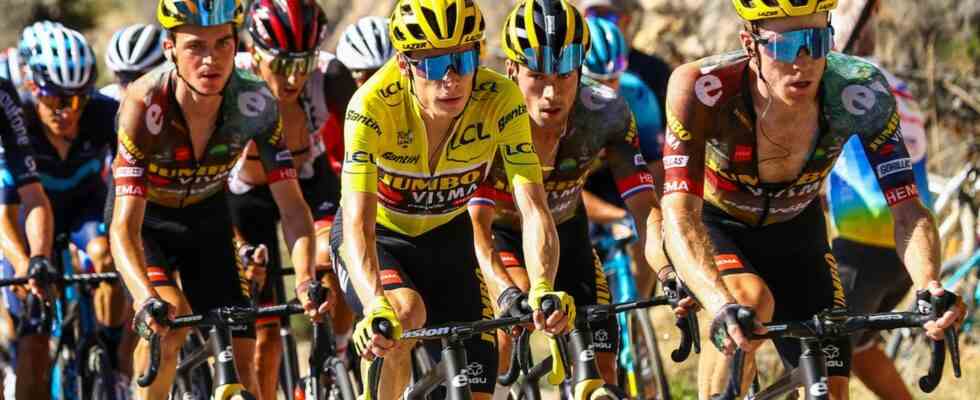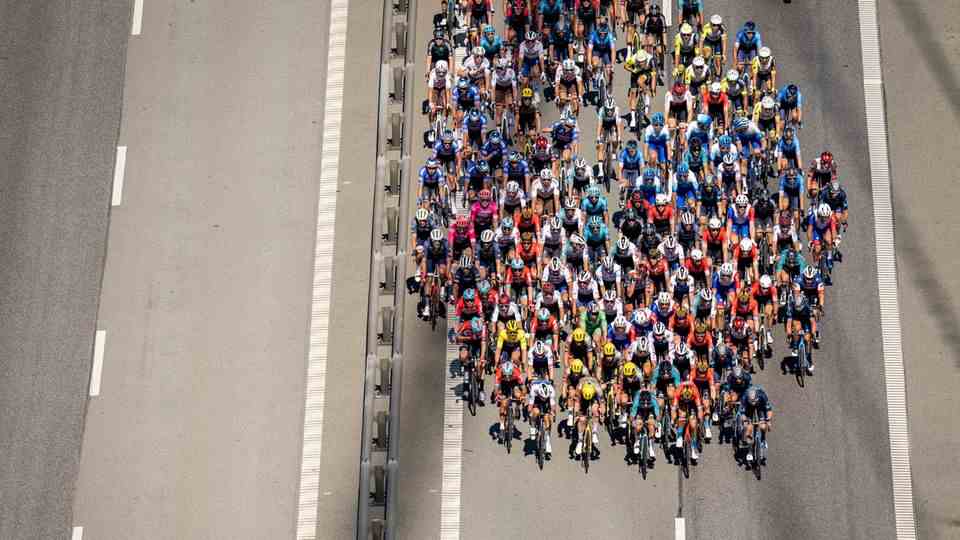Doping at the Tour de France?
Swallow everything that’s legal: ketones are the new magic drug for cyclists
Team Jumbo-Visma, here with the man in the yellow jersey, Jonas Vingegaard, is working with a scientist who is optimizing the intake of ketones
© David Pintens / DPA
Doping at the Tour de France? Not an issue at the moment. The professionals have refined their methods and rely, among other things, on ketones, endogenous substances and above all: legal. The problem: Nobody knows what consequences a massive intake has on the body.
The Tour de France was and is an event that also fascinates millions of fans in Germany. When the drivers struggled up the mountain in Alpe d’Huez on Thursday afternoon, an average of 1.5 million viewers cheered on TV and let ARD commentators Florian Naß and ex-racing driver Fabian Wegmann convey the myth of the most prestigious Tour de Explain France stage.
However, one dominant topic in recent years has been almost absent: doping. For seven years no rider has been excluded from the tour because of this, for 18 months no professional has been transferred to the World Tour, the highest racing series of the world cycling association UCI (the tour is part of it).
A clean Tour de France is an illusion
So is the tour clean now? Probably not. Europol conducted 14 searches in six countries on Team Bahrain-Victorius before the tour. Last year, the responsible public prosecutor’s office in Marseille had the team frisked in the Pyrenees. The results of the investigations are pending. You can also have justified doubts about a clean tour, because some doctors and team officials who were already active in the epo-infested 90s and noughties are still part of the cycling circus today.
However, something has apparently changed – for the better. The “Neue Zürcher Zeitung” summarized its observations on the Tour de France as follows: “Doping has not been defeated. The number of cheats has fallen, but they have become more sophisticated.”
The German anti-doping expert Professor Fritz Sörgel confirmed opposite stern.dethat the “tests are at a high level” and that the controls are better. Nevertheless, it can be assumed that classic doping will continue, only in very small doses, which are also highly effective. “Microdosing will play a role,” Sörgel believes. Whether Epo, testosterone or growth hormones – even in the smallest doses, the substances unfold their effect and are only detectable for a short period of time.
The wonders of medical research
Experts such as Sörgel or the French anti-doping fighter and former professional cyclist Christophe Bassons consider another trend to be more important: using the legal possibilities of medicine to its limits and with professional means. In an interview with the “Süddeutsche Zeitung Bassons said: “Nowadays the medical support is much more extensive than before, so you can drive almost at the same level as doped people. But this medical support scares me almost more than doping.”
The teams now use legal, medical performance optimization much more professionally. There is “so much money involved that you do your own research” and do studies with “endogenous substances” to optimize performance in a legal way. The magic drug is currently ketones, which are not forbidden.
Ketones are a group of substances that increase endurance and accelerate recovery. They are formed in the liver when the body runs out of carbohydrates and goes to body fat during exercise. They are the body’s energy reserves.
World Cycling Federation warns of ketones
An example of the professional use of ketones is the Jumbo-Visma team, which currently has Jonas Vingegaard as the tour leader and Wout van Aert as the best sprinter. The Dutch team is open about the topic. It works with a scientist who plans the entire nutritional strategy, including ketone intake. Other teams keep their handling of the legal wonder drug a secret, apparently they don’t want to be looked at in the cards. Or maybe you don’t want to admit that you don’t work as professionally as Jumbo-Visma.
The problem: Nobody knows what the consequences of excessive intake of the substance have on the body. Therefore, the UCI warns against taking the drug. That’s nice, but as long as ketones are not on the doping list, they’re pretty much useless. Whether that will ever be the case cannot be predicted. “Bringing the body’s own substances onto the doping list is difficult,” says anti-doping expert Sörgel. You now have to “get to the methods of how the body’s own regulation” is operated in cycling. Perhaps at some point it will go as far as in Formula 1, in which numerous technical tricks and certain designs on the engine and aerodynamics are prohibited.
Sources: “Southgerman newspaper”, “sport show”, “The New Zurich Times”, “radsport-rennrad.de”, “Meedia”



